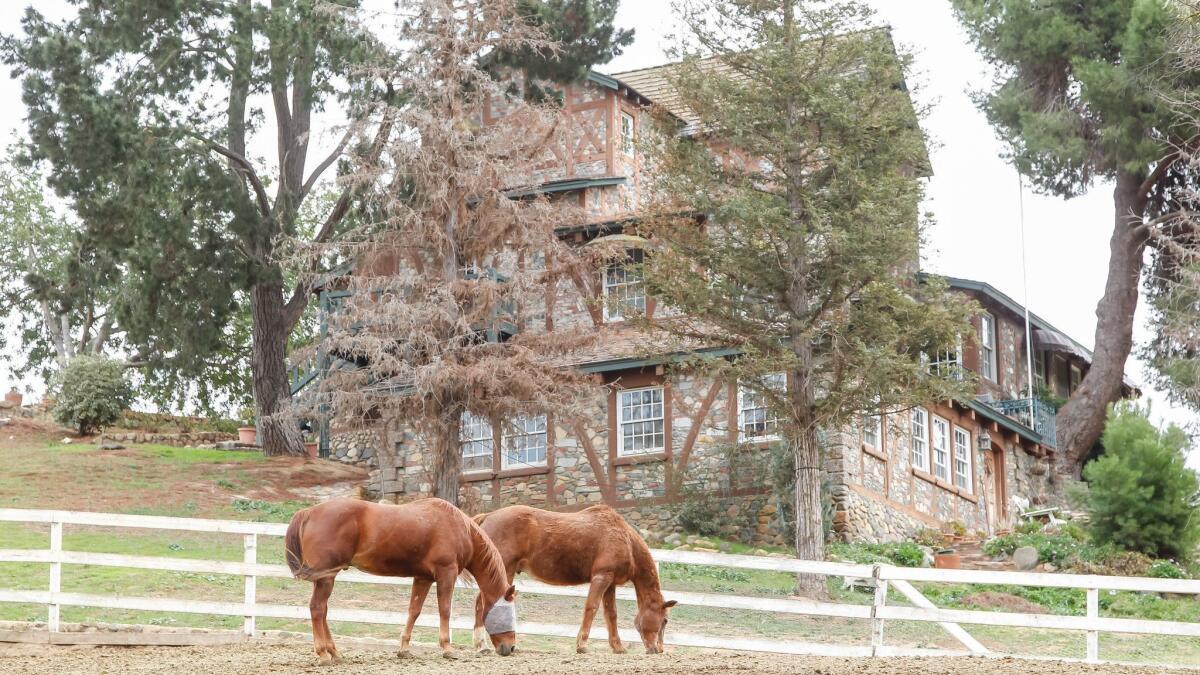Controversial horse rescue evicted; operator faces $4-million lawsuit

- Share via
Reporting from San Diego — HiCaliber Horse Rescue is gone.
The controversial operation that earned the wrath of horse lovers, animal rights activists and rival rescues last year amid allegations of fundraising fraud, improper euthanasia of old and crippled horses, and mistreatment of animals ceased operation last month.
Michelle Cochran, the brash leader of the rescue, and her supporters were evicted from the property they leased in rural Valley Center and are being sued by the owner, who is seeking $4 million in damages.
The HiCaliber signs are gone from the 15-acre ranch, replaced only by the name of property owner, Brenda Markstein, on a lone mailbox.
According to the lawsuit, filed Nov. 26 in Vista Superior Court, Cochran, who also goes by the last name Knutilla, failed to pay the monthly rent of $6,000 from July to November of last year as well as additional rent for use of a tractor.
Cochran, according to the lawsuit, further breached the lease, which was first entered into in 2014, “by damaging the property in an abusive vexatious manner including irreparable damage to residential structures, farmlands, barns and ranch buildings, pens, stalls, landscaping trees, drainage and otherwise,” wrote attorney G. Richard Green in the complaint.
Court files indicate Cochran has yet to responded to the allegations. She declined to comment when reached by a reporter.
Things began to fall apart for HiCaliber in 2017 when online attacks targeted the rescue. Numerous investigations by various local and state agencies began, and HiCaliber’s extensive online fundraising abilities were crippled.
Cochran called her detractors haters and said the accusations were borne from jealousy about the success of her operation. She said her personality also made enemies in the horse rescue world.
In April, Cochran announced the ranch would close by June and the more than 100 horses on the property would be adopted out. By Dec. 13, when sheriff’s deputies came to the property to execute the eviction, there were still a couple dozen horses on the property and volunteers said conditions at the ranch had deteriorated dramatically.
Cochran and co-defendant Romney Snyder were allowed to take 22 horses to another ranch in Valley Center. The location of that property has not been revealed.
Later that day, according to published reports, Markstein and others toured the property and found the main home and other buildings trashed. A spokesman for Markstein and her husband, Travis Fox, said the ranch was filthy.
Markstein told the nonprofit news organization inewsource.org that the damage to the main house was extensive and included urine-soaked floors. A spokesman said after the eviction the body of a baby horse was found buried in a pile of manure.
In a statement, Fox said that when a professional cleaning company came onto the property following the eviction, workers wore hazardous material suits while cleaning the main house.
“That was $20,000 down the drain just to make the home livable again,” he said. “We have two more units that still need to have the animal and human feces cleaned out.”
Markstein told inewsource she had been trying to get Cochran and the others off the property for months, but the legal process took time.
“We shared so many beautiful memories on the property prior to renting it out,” she said in the statement. “Now it brings tears to my eyes when I walk through here. How could someone live like this? How could they treat innocent animals this way? I only hope we can get it back to where it was and put this nightmare behind us.”
Back in 2014, things were far different. HiCaliber was about to be evicted from a smaller property in northern Escondido where a monastery that had been leasing some of its land to what was then a much smaller rescue operation decided it needed the property for expansion.
An article in a horse-related magazine depicting HiCaliber’s need for a new home came to the attention of Markstein and her husband, at the time Los Angeles residents, who agreed to lease the property to the rescue. Cochran called it a Godsend at the time and for several years the ranch flourished.
Horses came to the ranch in various ways. Some were neglected horses that had been seized by authorities. Some were starving or abandoned horses. Many were purchased by HiCaliber at auctions, outbidding what Cochran called “kill buyers” who purchased horses with the intent of reselling them to slaughter houses in Mexico.
But by early 2018, there were about 150 horses on the property, far more than were permitted by the county. As online criticism increased, and complaints were filed with the county and other agencies, officials began looking closely at the operation.
The county noted numerous minor violations of county code, all of which were handled administratively. In March, the state attorney general’s office suspended the nonprofit rescue’s ability to raise funds because of improper tax filings. Cochran admitted there had been paperwork issues. Less than two months later, after the proper paperwork had been filed, fundraising efforts were reinstated. But by then, the bad publicity surrounding the rescue had doomed the enterprise.
The controversy surrounding Cochran and HiCaliber appears to have been based at least partly on a fundamental difference of opinion about what a horse rescue should be.
Cochran believes putting a sick horse out of its misery is a viable, even sacred duty.
Critics said some of the horses Cochran would kill, usually with a gunshot to the head, could have been saved. They said her euthanasia practices were out of control and her fundraising techniques questionable.
Cochran denied all wrongdoing.
Various agencies opened investigations, but no charges have been filed and it is unclear if any are still ongoing.
In the statement, Fox said he and his wife thought they were doing a public good by giving HiCaliber a discount on rent to help horses in need.
“Instead, our 15 acres has been reduced to a landfill,” he said. “At least 30 truck loads of manure are still piled up, the homes are unlivable, and there were animal carcasses all over the property. This place has become a death camp and we are doing everything we can to help heal the land.”
Jones writes for the San Diego Union-Tribune.
More to Read
Sign up for Essential California
The most important California stories and recommendations in your inbox every morning.
You may occasionally receive promotional content from the Los Angeles Times.














